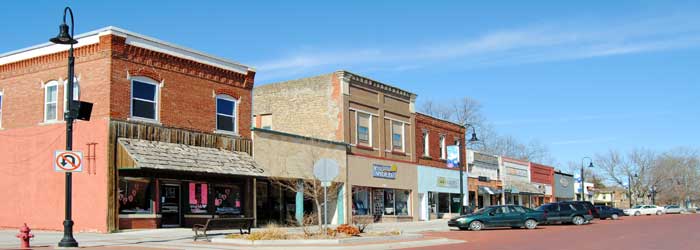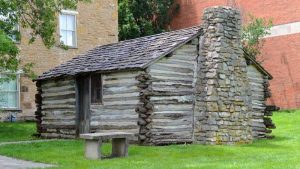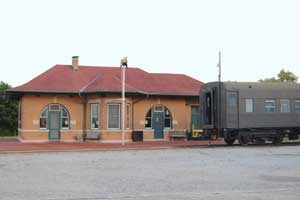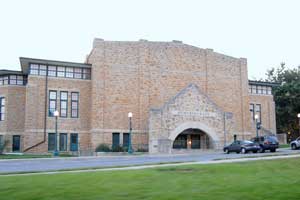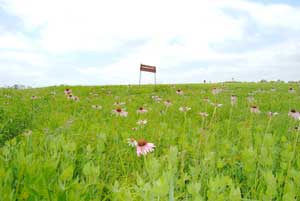Baldwin City, Kansas – Legends of Kansas (original) (raw)
Baldwin, Kansas Business District by Kathy Alexander.
One of the oldest settlements in Kansas, Baldwin City is located about 15 miles south of Lawrence in Douglas County and got its start during the opening days of Kansas Territory when it was little more than a stop on the Santa Fe Trail.
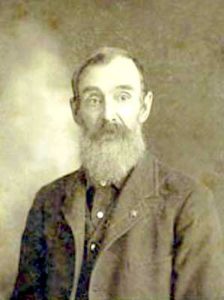
Robert Hall Pearson
The Clearfield School District in Palmyra Township was established in 1852 by German settlers. It is the second oldest school district in Kansas. Soon a log structure was built and students were taught in German.
The first settlement near the present townsite was made in 1854, by Robert and Richard Pearson. In June 1854, a townsite consisting of 320 acres, was platted by the Palmyra Town Company and the new town was called Palmyra. The original townsite Paymyra was platted to be 8 blocks wide and 12 blocks long with four city parks. It included a well, a blacksmith shop, and a general store, all of which were important to travelers on the Santa Fe Trail.
The first building was soon erected and used for a dwelling by J. Cantrell. W. Westfall next built a second cabin and opened a store and the town company also erected a building known as the old barracks, which became the second store. A hotel was also built by the company and was called the Santa Fe House. Dr. Simmons and Dr. Pierson were the first physicians, at which time the town had a harness shop, a blacksmith, lawyer, drug store, a tavern, several stores, a good hotel for the period, and a number of dwellings. Religious services were first held at residences by the Methodist Church in 1855.
Before the Civil War, Baldwin City was situated in the midst of several events of the Kansas-Missouri Border War, including the Battle of Black Jack that occurred about three miles east of Baldwin on June 2, 1856.
Replica Kibbee Cabin at the Old Castle Museum. Here, leaders met and decided to form a college in Palmyra, which is now Baldwin City. Photo courtesy Old Castle Museum.
The Palmyra post office was established in June 1857, with N. Blood as the first postmaster.
In 1858, the town company purchased a section of land adjoining Palmyra on the north and donated it to the Kansas Educational Association of the Methodist Episcopal Church on the condition that they locate a college known as Baker University on the site. The section of land was surveyed into lots and sold, with the proceeds used to erect the college building. As the work on the university building progressed, a number of houses were erected in the area, which soon became known as Baldwin, in honor of John Baldwin of Berea, Ohio, who was the primary benefactor of the college. Business buildings were also erected and one by one the business enterprises of Palmyra moved to Baldwin. That same year, the Methodist Church built a chapel that was used by the congregation. Baker University is the oldest four-year college in the state of Kansas and four of its buildings are now listed on the National Register of Historic Places.
The same year, John Baldwin erected a 30’x40′ limestone saw and grist mill at the present-day site of Fifth and Indiana Streets and inaugurated other commercial enterprises, which proved the death blows to the old town of Palmyra, which later was abandoned. Years later, the mill was converted to a steam grist mill called Castle Mills in 1890. Once it was no longer essential, the building became a museum at Baker University called the “Old Castle Museum”.
John Baldwin’s mill now serves as the Old Castle Museum at Baker University in Baldwin, Kansas. Photo courtesy Old Castle Museum.
The post office was moved and the name was officially changed from Palmyra to Baldwin City on May 22, 1862.
After the Lawrence Massacre in August 1863, Quantrill’s Raiders withdrew to the South passing within three miles of Baldwin City.
In 1867, the Leavenworth, Lawrence, and Fort Gibson Railroad laid tracks and became the first Kansas railroad south of the Kansas River. The city continued to grow and by the turn of the century, it boasted a number of beautiful homes, churches, retail stores of all kinds, a fine public school, water and lighting systems, a money order post office, and a telegraph.
Baldwin City was incorporated on September 22, 1870.
In 1900, the Clearfield School was built northeast of Baldwin City. This school building replaced an earlier log structure. It was originally built at a location one mile east but was moved to its current location in 1908. The school closed in 1946, but it continued to serve as a meeting house for the Clearfield Grange until it disbanded in 1991. Today, the building is on the National Register of Historic Places. It is located at 2162 North 600 Road.
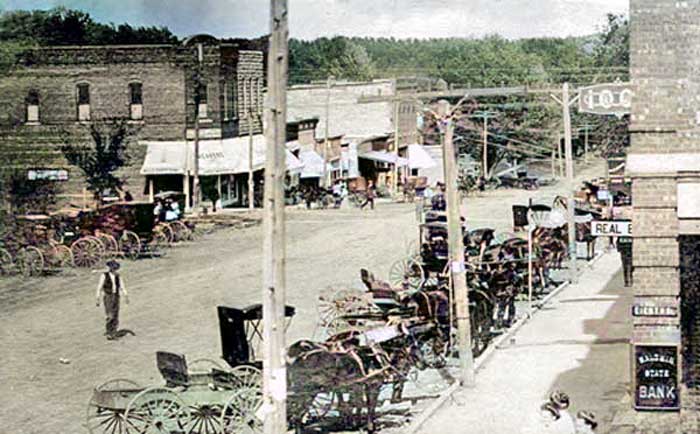
Baldwin City, Kansas 1911. Colorized.
In 1906, the Santa Fe Depot was built and today it is the only remaining depot of Kansas’ first railroad south of the Kansas River. By 1910, Baldwin City boasted some 1,265 residents and had become one of the leading educational centers in the state.
Santa Fe Depot in Baldwin, Kansas by Kathy Alexander.
Today, Baldwin City is a quaint little community of about 4,700 residents that continues to feature its rich history in numerous historic homes and buildings, original hand-laid brick streets, the historic Baker University buildings, and the Old Castle Museum.
A major attraction each year is the Maple Leaf Festival which has occurred every year since 1958 on the third full weekend in October. It is the largest fall family event in the area and features a parade, arts and crafts, quilt show, theatrical performances, history tours, train rides, and live music. Attracting nearly 25,000 visitors annually, it is the largest fall family event in the area.
The Santa Fe Trail, which linked east to west between 1824 and 1875, passed through Baldwin City. People today can still travel a section of the road that those early settlers traversed or view the ruts carved by the heavy wagons.
Memorial Hall at Baker University, Baldwin City, Kansas by Kathy Alexander.
Located on US 56 Highway, approximately three miles east of Baldwin City, the Black Jack Highway Park commemorates the Battle of Black Jack that took place on June 2, 1856. Here can be seen an authentic log cabin that contains many antiques from the Santa Fe Trail era. A small footbridge and trail connect the park to the Ivan Boyd Prairie Preserve, located immediately south, containing evidence of wagon ruts carved into the prairie as part of the Santa Fe Trail. On a rise overlooking the battlefield is a farmhouse built by Robert Hall Pearson in the 1880s. Pearson fought beside John Brown at Black Jack and later returned to carve out a prosperous farm from the prairie.
More Information:
Baldwin City, Kansas
City Hall
803 8th Street
P.O. Box 86
Baldwin City, KS 66006
785-594-6427
Santa Fe Trail ruts at the Black Jack Prairie Reserve by Kathy Alexander.
©Kathy Alexander/Legends of Kansas, updated February 2023.
Also See:
Santa Fe Trail in Douglas County
Sources:
Baker University
Baldwin City, Kansas
Blackmar, Frank W.; Kansas: A Cyclopedia of State History, Vol I; Standard Publishing Company, Chicago, IL 1912.
Cutler, William G; History of Kansas; A. T. Andreas, Chicago, IL, 1883.
